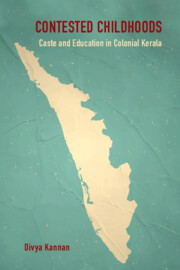3 - Ora et Labora
Published online by Cambridge University Press: 28 November 2024
Summary
In the story of British colonialism in India, we often overlook the role of other European actors, especially those who lived in close contact with the local populace. The predominantly German-speaking, Switzerland-based Basel Evangelical German Missionary Society (BM) was one such group that lived and functioned under the aegis of British rule in India from 1834 onwards. On the Malabar coast, in the southwestern part of the subcontinent, they saw themselves as members of a broader religious community than those confined within specific territorially defined boundaries and forged a cordial relationship with several administrators. The BM was also a beneficiary of the European foreign evangelical movement during the early nineteenth century and postured itself like its contemporaries as a mission to save ‘heathen souls’ in faraway lands, especially children. This chapter explores the complex encounters between the BM and the local poor children of low-caste and, sometimes, mixed-race descent, supervised in their boarding schools or orphanages in various parts of British-administered Malabar. The Basel missionaries established the first residential institutions for poor and needy children in the predominantly Malayalam-speaking region, where they sought to establish ‘model’ Christian communities. In their attempt to erase caste-inscribed markers, the Basel missionaries negotiated with different adults and children to run these establishments. In fact, ‘orphans’ were not always without parents, and the BM employed coercive measures to admit pupils by arguing against the ‘barbarity’ of Indian parenting and childhood norms. They were not always successful as children influenced decision-making processes and resisted strategies of emotional disciplining and modes of labour regulation imposed on them. Exploring these dynamic encounters of local populations with non-Britons in determining educational agendas helps us understand transregional histories predicated on ideas of ‘whiteness’.
The earliest cohorts of German-speaking Basel missionaries encountered a myriad of people upon their arrival in southwestern India. In addition to Malabar's many castes and religious communities who spoke Malayalam, the coastal villages and towns were also home to Portuguese sailors, Dutch traders, English soldiers, Tamils, Telugus, and other migrants. Such diversity was most evident among the earliest educational and boarding establishments in the BM's walled mission compounds.
- Type
- Chapter
- Information
- Contested ChildhoodsCaste and Education in Colonial Kerala, pp. 124 - 172Publisher: Cambridge University PressPrint publication year: 2025

